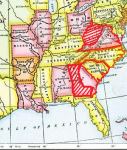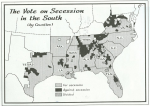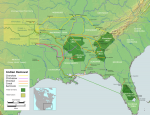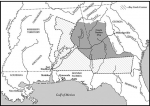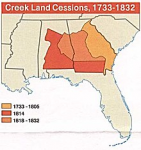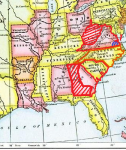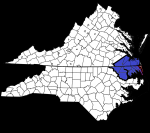Jackson Lennock
Well-known member
The early 1830s was a tumultuous period with a lot of sectional matters coming to a boil:
I could see a few dominoes happening which trigger a very different United States.
First, Jackson had two major counsel throughout the Nullification Crisis: the conciliatory Martin Van Buren and the Hardline former Federalist Daniel Webster. If Van Buren had been successfully sent off to be Minister to the United Kingdom in 1831 (Calhoun was the tiebreaker ... while he was Jackson's VP ... what a piece of work), then it's the hardline Webster that Jackson is listening to. Jackson doesn't back down on the Tariff, and South Carolina tries to secede.
Second, the Indian Removal Act of 1830 fails in the House. Historically it passed 101 to 97. Georgia would be very bothered by this.
Third, John Marshall actually seeks federal enforcement of Worcester v. Georgia. I'll emphasize - the only thing at issue in Worcester was whether Worcester should be freed, and Georgia did this historically without the Court asking for Federal enforcement. Here, they ask for enforcement and Jackson abides. "I will enforce it." Georgia announces it will be in league with South Carolina on the resistance to northern and western forces (Jackson being more a western frontiersman than a Southerner).
Fourth, as Jackson brings down the hammer on Georgia and South Carolina, Virginia (at least, as the Virginians disliked nullification but also thought Jackson was crossing the line) joins suit. This perhaps is followed by Alabama and Mississippi, but those states seems less anti-Jackson OTL than Virginia, Georgia, and South Carolina and were more firmly 'western' states on the frontier than they were southern states at this point.
Fifth, there's the Nat Turner Rebellion. The vote to manumit slaves in Virginia in 1831-1832 failed by a vote, and here it passes by a vote.
My guess is that the Creek and Cherokee side with Jackson and the Union against Georgia if Georgia tries to secede. Jackson, whatever his biases and bigotries, ultimately cared first and foremost about whether you were with him or against him. He had no qualms with Creek Soldiers at the Battle of New Orleans, for example. The punishment imposed on Georgia could be the Cherokee getting their status protected and the Creek (who had been forced over into Alabama in 1827) getting their lands back in Georgia. In doing so, Jackson is making more room available for his supporters in Alabama too.
South Carolina and Virginia had strong internal cleavages during the period, and Jackson could simply take the approach of coalescing with the pro-union side in both states. Georgia seems unique in that its political process across parties was united on challenging Federal Authority.
Sixth, Justice Baldwin (who Jackson put on) retires in 1831 (which he considered doing OTL) and is replaced by a more Nationalist figure who'd be in the Marshall-Story-Johnson camp on the Court (Johnson being the Justice who suggested the Second and Fourth Amendments applied to the States). It could be John Quincy Adams, as a means of Jackson getting rid of him, Webster (to reward his loyalty but get him out of the way on the issue of the Bank), Van Buren (if he isn't sent to the United Kingdom ... and I assume judicial duties would lead to him not having as open a discussion with Jackson), or Roger Taney (made AG in 1831, considered a more moderate figure in his early years than later on), or somebody else. The Supreme Court rules in favor of Barron in Barron v. Baltimore, and the Due Process of Law and Takings Clauses apply against the states, kicking off a process of Incorporation.
Webster's OTL aim to try and meld the Jackson-Webster alliance into a 'Constitution and Union Party' could perhaps succeed here.
If Virginia does emancipation, it will make it very difficult in Maryland and Delaware to maintain. It could be an example for North Carolina and Kentucky and Tennessee as well, and foster a general politics of anti-planterism in the South (with a lot of antislavery politics in the south historically being tied to opposition to primogeniture - ergo, opposition to consolidated control of land and opportunity by the planter elite). The South divided, the Court nudging in the direction of not opposing Slavery where it is but not letting it expand further, and there being more political opposition to it without knee-jerk antinortherism buttressing the planters' political base, and you could get a rotting away of slavery over time.
Plus, efforts at industrialization which the Planters blocked OTL (like the 1850s proposal to do industry in Birmingham) might succeed. Influx of immigration would weaken slavery.
- Tariffs, which had a north-south split
- Slavery, which did not yet have a clear north-south split as the antislavery movement was concentrated in the Upper South at this time. Nat Turner's Rebellion and the failure of manumission proved a watershed moment.
- Incorporation of the Bill of Rights. Barron v. Baltimore was only in 1833, and it was an open question of those provisions of the Bill of Rights which did not explicitly mention the Congress (2, 3, 4, 5, 6, 7, 8, and 9) applied to States. Prior to his moment, at least one Justice on the Court (Johnson) and two State Supreme Courts (New York and Pennsylvania) had suggested states had to follow certain Bill of Rights Provisions (The Second Amendment, Fourth Amendment, the Fifth Amendment provision on Double Jeopardy, and possibly the Seventh)
- Indian Removal - an issue of significant importance in Georgia and the old Southwest; which the North wasn't very keen on since it wasn't their problem anymore (not that they'd been much kinder a century prior)
I could see a few dominoes happening which trigger a very different United States.
First, Jackson had two major counsel throughout the Nullification Crisis: the conciliatory Martin Van Buren and the Hardline former Federalist Daniel Webster. If Van Buren had been successfully sent off to be Minister to the United Kingdom in 1831 (Calhoun was the tiebreaker ... while he was Jackson's VP ... what a piece of work), then it's the hardline Webster that Jackson is listening to. Jackson doesn't back down on the Tariff, and South Carolina tries to secede.
Second, the Indian Removal Act of 1830 fails in the House. Historically it passed 101 to 97. Georgia would be very bothered by this.
Third, John Marshall actually seeks federal enforcement of Worcester v. Georgia. I'll emphasize - the only thing at issue in Worcester was whether Worcester should be freed, and Georgia did this historically without the Court asking for Federal enforcement. Here, they ask for enforcement and Jackson abides. "I will enforce it." Georgia announces it will be in league with South Carolina on the resistance to northern and western forces (Jackson being more a western frontiersman than a Southerner).
Fourth, as Jackson brings down the hammer on Georgia and South Carolina, Virginia (at least, as the Virginians disliked nullification but also thought Jackson was crossing the line) joins suit. This perhaps is followed by Alabama and Mississippi, but those states seems less anti-Jackson OTL than Virginia, Georgia, and South Carolina and were more firmly 'western' states on the frontier than they were southern states at this point.
Fifth, there's the Nat Turner Rebellion. The vote to manumit slaves in Virginia in 1831-1832 failed by a vote, and here it passes by a vote.
My guess is that the Creek and Cherokee side with Jackson and the Union against Georgia if Georgia tries to secede. Jackson, whatever his biases and bigotries, ultimately cared first and foremost about whether you were with him or against him. He had no qualms with Creek Soldiers at the Battle of New Orleans, for example. The punishment imposed on Georgia could be the Cherokee getting their status protected and the Creek (who had been forced over into Alabama in 1827) getting their lands back in Georgia. In doing so, Jackson is making more room available for his supporters in Alabama too.
South Carolina and Virginia had strong internal cleavages during the period, and Jackson could simply take the approach of coalescing with the pro-union side in both states. Georgia seems unique in that its political process across parties was united on challenging Federal Authority.
Sixth, Justice Baldwin (who Jackson put on) retires in 1831 (which he considered doing OTL) and is replaced by a more Nationalist figure who'd be in the Marshall-Story-Johnson camp on the Court (Johnson being the Justice who suggested the Second and Fourth Amendments applied to the States). It could be John Quincy Adams, as a means of Jackson getting rid of him, Webster (to reward his loyalty but get him out of the way on the issue of the Bank), Van Buren (if he isn't sent to the United Kingdom ... and I assume judicial duties would lead to him not having as open a discussion with Jackson), or Roger Taney (made AG in 1831, considered a more moderate figure in his early years than later on), or somebody else. The Supreme Court rules in favor of Barron in Barron v. Baltimore, and the Due Process of Law and Takings Clauses apply against the states, kicking off a process of Incorporation.
Webster's OTL aim to try and meld the Jackson-Webster alliance into a 'Constitution and Union Party' could perhaps succeed here.
If Virginia does emancipation, it will make it very difficult in Maryland and Delaware to maintain. It could be an example for North Carolina and Kentucky and Tennessee as well, and foster a general politics of anti-planterism in the South (with a lot of antislavery politics in the south historically being tied to opposition to primogeniture - ergo, opposition to consolidated control of land and opportunity by the planter elite). The South divided, the Court nudging in the direction of not opposing Slavery where it is but not letting it expand further, and there being more political opposition to it without knee-jerk antinortherism buttressing the planters' political base, and you could get a rotting away of slavery over time.
Plus, efforts at industrialization which the Planters blocked OTL (like the 1850s proposal to do industry in Birmingham) might succeed. Influx of immigration would weaken slavery.


